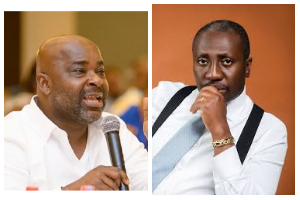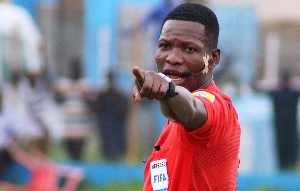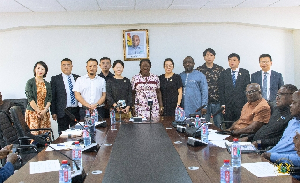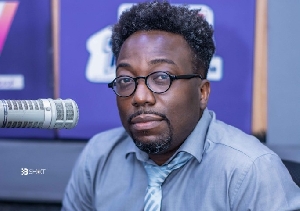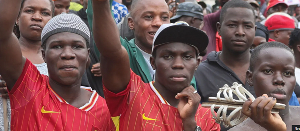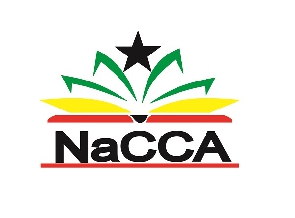SAVING GBAGBO WITH THE LANGUAGE OF DIPLOMACY
BY SAMUEL ADJEI SARFO
INTRODUCTION
For those ensconced in their comfort zone that the Ivorian crisis cannot happen in Ghana, the following account must provide a sobering reflection: a miniature scenario that was a precursor to the travesty of democracy in Ivory Coast occurred in the New Juaben North Constituency during the primaries to select the NPP parliamentary candidate. There, Hackman Owusu Agyemang successfully hijacked the democratic principle by imposing himself on the electorates. After his failed bid to secure the presidential nomination, Hackman returned to the constituency and began his machination to steal the parliamentary nomination. He led a protest march against his main opponent, Dr Samuel Annor on the spurious allegation that Annor did not resign his position as NPP Regional Treasurer before filing his nomination papers for the New Juaben North parliamentary contest. Against all evidence to the contrary, Hackman succeeded in getting the party machinery behind him, and by a blatant act of political chicanery, he assembled his henchmen to coronate him as unopposed. Concerned about this mockery of democracy, I organized a demonstration against the fake declaration of Hackman Owusu Agyemang I only wanted democratic principle to prevail, and had hoped that a level playing ground would be facilitated for the people to nominate any candidate of their choice. The response of Hackman Owusu Agyemang, together with Nana Adjei Boateng, Municipal Chief Executive, was to send over three hundred members of the police force to break up our legitimate demonstration.
Later, when the NPP lost the elections and unwisely proceeded to court to have the results delayed, I wrote these memorable words:
“Akuffo-Addo’s post-election posturing can only be interpreted as the party’s further parting of ways with its core democratic principles: a candidate is defeated in an election and he thinks it lies within his power to reverse the will of the people….. Such untrammeled power has never lain with anyone in Ghana. The voice of the people is the voice of God, and President Kufuor and Mr. Da Rocha, both astute politicians, know better than to imagine for a minute that the outcome of the elections could be reversed by any man………” ( See my article published on Ghanaweb on January 6, 2009. Title: The Defeat of the NPP and What It Portends for the Party).
I have fought against fraud and undemocratic tenets from the beginning of time and I will continue to fight against them to the end of my time. To me, the principle is the same no matter the party, tribe, creed or religion to which it applies: power to the people is an empty hortatory unless it is backed by the sovereign right of the people to choose their own leaders. In Ivory Coast, the people spoke clearly to choose their own leader under the watchful eyes of the entire world community. Gbagbo accepted the results of the first round without question because it favored him. The same electoral machinery was put in motion in the second round. Because he lost, he is putting forward all kinds of empty rhetoric and infantile arguments with the sole purpose of clinging to power: he has blamed his plight on western imperialism; he has taken cover under the name of patriotism while dividing up his country along ethnic lines. He has questioned the legitimacy of a contract which he duly signed with the international community, and for which the nations poured huge sums of money into the conduct of the Ivorian elections. While loudly second-guessing the merits of said contracts, he has sealed his eyes to the ends of justice and fair play for which all contractual relations aim, taking refuge instead under refutable excuses which will not convince the most ignorant trier of fact.
By Gbagbo’s present posture, it is ridiculous for anyone to proffer faith in dialogue and negotiations, because to him, only one conclusion exists in all discourse: that he remains president over a people who have already rejected him. And his laughable argument? That the constitution enabled the Constitutional Council to proclaim him winner, in spite of what the people have clearly proclaimed by their popular franchise. In support of this porous argument, a gentleman once wrote to me asking whether I believed in the constitution of my country. I answered as follows:
“Remember that racism was once sustained by the American constitution. Remember that apartheid South Africa was once sustained by that country’s constitution. Per se, a constitution is not valid until it finds consonance with the human conscience, judgment and morality. A constitution is patently flawed if it overrides the voice of a people expressed through a proper franchise.”
The disenfranchisement of the people of northern Ivory Coast worries me particularly because northern Ivory Coast shares the same demographics with our own northern brothers and sisters. And the kind of principle the Ivorian situation invokes could be replicated in Ghana where, as in Ivory Coast, the northern people have been deprived of privileges taken for granted in the south from time immemorial. Were xenophobia to grip Ghana as it has Ivory Coast, the people of the north will be the most vulnerable. Let us remember that in Ghana, xenophobia gripped the nation in the late sixties which led to the regrettable expulsion of second and third generation Nigerians back to their country. It is possible for one to envisage a day when the revival of tribal hatred will see other Ghanaians stripped of their citizenship and asked to leave the country, or at least, have their voting rights somewhat abridged, using the Ivorian template as a modus operandi. But if our government condemns the strategy used by Gbagbo, some of us will be assured that Ghana will never enter the dark ages of ethnocentrism when the citizenship right of her people will ever be questioned or abridged.
Furthermore, the political condition in our country is volatile enough to implicate the Gbagbo template. Think of the possibility that only 40,000 votes separated the NDC from the NPP in the 2008 elections. And think of the ease with which an incumbent government can bridge such a gap through facile fraudulence, then you will conclude that our democracy is fragile enough to fall on the lap of mischief makers. But if we are decisive on Ivory Coast, then the warning will be clear on the wall: let no one dare mess with our democratic dispensation. If we assume indifference or neutrality and take cover under a suspect diplomacy, our own democracy will remain on shaky grounds.
As far as I know, the mischief-makers are already hard at work. They have already cast a clear issue of a leader’s fraudulence in terms of the images of war and peace. Without so much as rebuking Gbagbo for his recalcitrance, Ghana has virtually declared neutrality under the guidance and advice of F.P. Rawlings, watered down a strategic threat of partners aimed at persuading Gbagbo to step down, and completely gone rogue on a scheme that is more likely to succeed in getting Gbagbo to step down without further bloodshed. Conversely, Ghana has remained loudly silent about the fraud perpetrated by Gbagbo and refused to make a direct call on him to step down.
Instead of stating the issue clearly as one involving a scoundrel who lost an election and refused to step down, the issue has been framed as a debate involving whether or not Ghana should join Ecowas to invade Ivory Coast. A headline screamed out from an article from a respected writer on Ghanaweb, “Ghanaian Soldiers should not Go and Die for Gbagbo!” By that seemingly innocuous title, three dangerous assumptions have already been wrongly made: 1. That a request has been made, or will be made to the Ghana government for troops to go and fight in Ivory Coast. 2. That if or when such request comes, the Ghana government should decline. 3. That should the government oblige to such a request, then Ghanaian soldiers will by all means go and die for Gbagbo. None of these assumptions is necessarily true. No Ghanaian soldier’s blood need be spilled at all in the case at issue in Ivory Coast. But at least if Ghana had joined its partners in keeping all options on the table, Gbagbo’s confidence wouldn’t have been bolstered by Ghana’s open dent in the position of Ecowas.
Several options have been thrown around by pundits to resolve the Ivorian crisis. The first is a vote recount. That is certainly an exercise in futility because the recount will create more problems than solve any. Even if we agree that the ballots have not been tampered with, the outcome will still be fruitless. This is because if the recount now goes in favor of Gbagbo, Ouattara is not going to accept. Likewise, nothing changes if a recount confirms a Ouattara victory: Gbagbo will find a panoply of reasons to remain in power. Furthermore, several international observers have stated categorically that Ouattara won. None of significance has come to declare Gbagbo the winner, except the Constitutional Council which canceled half a million Ouattara votes overnight before declaring Gbagbo the winner. Moreover any international process of certification implies checks and rechecks of the votes and a recount at every stage necessary, and no doubt reasonably exists in the outcome to warrant a recount. Finally, if after all that has been done to secure the results, Gbagbo is still dissatisfied, the burden of proof lies with him to go through laid down procedure or furnish data to make his case. The burden of production lies with him. However, a recount shifts this burden to the Independent Electoral Commission and international actors who have formed an unequivocal conclusion that Ouattarra clearly won the elections.They need not convince themselves any further. It is Gbagbo that has to convince the world. Thus a recount is a very bad idea under the circumstances.
The foregoing arguments apply in equal measure to a rerun of the elections, and I need not repeat them here, except to say that a rerun is even worse than a recount in terms of the convoluted costs. In the end however, neither Ouattara nor Gbagbo will accept any results that go against them. What then is the point of a rerun of the elections? It is the worst imaginable option so far proposed.
Then there is the shining suggestion of power-sharing. This is obviously what Gbagbo prefers. To him, a diplomatic solution leads to only one conclusion--power sharing with him as the President of Ivory Coast and Ouattara as Prime Minister. But the dangers of Kenya and Zimbabwe where such doomed-on-arrival arrangements prevail should let us pull off power –sharing from the table. It has not worked in Zimbabwe. It has not thrived in Kenya. It is not going to work in Ivory Coast. And the cost to the democratic experiment in Africa is too huge for us to even remotely contemplate it. How can the loser of an election stay on as the President while the winner is given some inferior position as compensation for winning? Power sharing offends the sensibilities of all lovers of democracy by substituting the voice of the people with the expedient arrangements of parochial diplomats. Power sharing must not be an option in the Ivorian context. The ill-fated arrangement in Zimbabwe and Kenya must end in Ivory Coast.
The next possible resolution is through economic sanctions. Although slow, it could work if made effective and given enough time. The world has already put a panoply of sanctions on Gbagbo and his cronies. I believe Ghana, to demonstrate goodwill for the democratic outcome of the Ivorian elections, should at the very least expel the Ivorian ambassador and accept that of Ouattara as Canada , the UN and UK have done. Ghana should join the nations in taking the affirmative steps to isolate Gbagbo, so that we are not portrayed as giving comfort to a loser. If Ghana does this, it could signal a convincing option for a peaceful approach to a resolution of the Ivorian conflict. As long as countries like Ghana drag their feet on sanctions, the sanctions option will not yield the desired results.
The next option is a palace coup which now appears more likely than many people think. But this will bring about the Guei deja vu, where a person captures power for good cause and does whatever he can to cling to it. There is no guarantee that a person that seizes power from Gbagbo will necessarily hand it over to Ouattara, for if the Ivorian presidency has taught the world nothing at all, it has demonstrated its power to keep its keeper in its embrace. There is not a single example where an Ivorian president has voluntarily relinquished power to another. Those who have left have always been forcibly removed. A coup maker is too subsceptible to the temptation to perpetuate himself in power. Thus a coup will worsen the situation and set everything back farther down than where the country is today. The coup solution is thus untenable.
The final solution is an incisive commando type strike against Gbagbo. This is the option which people construe simplistically as involving an Ecowasl invasion of Ivory Coast. As I speak, French forces have gathered in Burkina Faso, and the pro-Ouattara rebels are rallying north of the country. The UN forces are ready to provide support and protection for Ouattara's government. There is discontent in the core of the Ivorian army. The country has no Airforce. Gbagbo is protected by his special forces and is already encircled, and he knows it! It will not take more than a day to take him out. This is the best solution of all because Gbagbo is sitting in a house of cards, and his removal by force will be quick and clean. Thus the suggestion of a full scale war is not even being contemplated by those advocating a forcible removal; yet the dooms-day scenario engendered by this proposition is what is catching the daily headlines. Instead of expending energy to condemn Gbagbo’s fraudulent act, the government of Ghana prefers to talk about an imaginary invasion and blood-spilling which has never even been contemplated by the Ecowas commanders. Slanting the discourse this way has the purpose of obfuscating the issue and helping to protect a Gbagbo presidency! Ghana’s loud silence on the calls for Gbagbo to quit, coupled with her intentional recasting of the issue in terms of a full-scale invasion when no commander has yet proposed an invasion leads to one simple conclusion: the government is protecting Gbagbo through the language of diplomacy.
And here is the truth: from the very beginning, Gbagbo has banked his hopes on the division within the international community, and Ghana’s president provided the first crucial sign of weakness within Ecowas that has encouraged Gbagbo to remain defiant. It would have been possible for Ghana to remain quiet; it would have been possible for Ghana to join in the strident calls for Gbagbo to step down. Indeed, it would have been possible for Ghana to recognize Ouattara’s diplomats and distanced herself from Gbagbo. Instead, the nation chose to declare its misgivings about a strategy which the President joined his compatriots to forge, and which does not necessarily lead to any invasion of Ivory Coast, or the involvement of any Ghanaian soldier in combat operations. What the nation has done merely prolongs Gbagbo’s grip on power for several months, and it does nothing to protect the image and interests of Ghana. Rather, it shames the country and portrays her as undependable, exposing her assets to danger when Ouattara finally assumes power as President of Ivory Coast. If the country’s policy is only aimed at loud pronouncements against war, misgivings about the elections, and loud silence about Gbagbo’s fraud and the need for him to step down, then Ghana is simply supporting Gbagbo and undermining Ouattara. This will go against our country’s image as a strong believer in democracy. Therefore, in lieu of our support for a non-existent invasion, we should demonstrate a good-will effort by acting in concert with the whole world to get rid of Gbagbo. Otherwise if we behave as ostriches and cover our heads in the sand of a so-called neutrality, we will wake up to deal with the danger of civil war in Ivory Coast. A civil war in Ivory Coast will be protracted and very destructive because both sides are well-armed this time round. A civil war will endanger our oil installations along the border with Ivory Coast and unleash refugees far above the number we contemplate because not only Ghanaians in Ivory Coast will descend on the nation; Ivorians will also come with them. Every fear of Ghana based on a war scenario will therefore be realized if we fail to act in concert with the world community to resolve the Ivorian issue by all means necessary.
Indeed, it would be possible to avoid the civil war scenario if Ghana acts in consonance with her partners and keeps all options on the table, including the military option. If Ghana had done this, she wouldn’t have been viewed as a renegade partner and an accomplice of Gbagbo. Indeed, we would have ended up not losing one soldier, but we would have preserved our integrity as a true partner in Africa’s quest for democracy.
By opening his mouth too wide about Ghana’s overstretched army and declaring his misgivings about an imaginary invasion, President Mills has given comfort and solace to Gbagbo and signaled to him the emptiness of the Ecowas military threat. By expressing his neutrality while keeping contacts with Gbagbo and maintaining his diplomats, President Mills has mortgaged the dignity and integrity of the Ghanaian image and standing in the eyes of the international community, created doubts about her foreign policy prudence and endangered Ghana’s human and economic interests in the Ivory Coast.
In conclusion, I posit that the Ivorian conflict will turn out to be more protracted and bloody because Ghana, a major partner of Ecowas, has spilled the beans by characterizing all military operations as armed invasion whereas the Ecowas threat could well have been a mere ploy to get rid of Gbagbo. I assert that Ghana’s action is a clear support for Gbagbo who may well be hanging on because of such unwitting utterances by the likes of President Mills. I declare that the fears expressed against war will be realized because of such diplomatic posturing like that of Ghana. I conclude that in the end, Ouattara will be president of Ivory Coast, and Ghana will go down as a renegade country which failed in the test to stand for the principles of true democracy.
My name is Sarfo the Black. I swear and affirm that I am of sound body and mind and capable of coherent articulation about these matters herein expressed. I am neither influenced by Alassane Dramani Ouattara to write whatever I have written here, nor have I sought to undercut the legitimate authority of Laurent Gbagbo by dint of any biased disposition against his person. I have no stake in the outcome of the Ivorian conflict, except as a true citizen of my country. I do not seek any gains or recognition or popularity whatsoever as a result of my position on the Ivorian crisis. Whatever I write about the Ivorian matter, I write out of the deepest recesses of my heart that truth may prevail; that all men and women the world over will be united in their quest for what is eternally right, so that in the end, the people’s voice will be respected in Ivory Coast, and that democracy will triumph throughout Africa………
Samuel Adjei Sarfo lives in Houston, Texas. You can email him at sarfoadjei@yahoo.com
Opinions of Saturday, 22 January 2011
Columnist: Sarfo, Samuel Adjei


